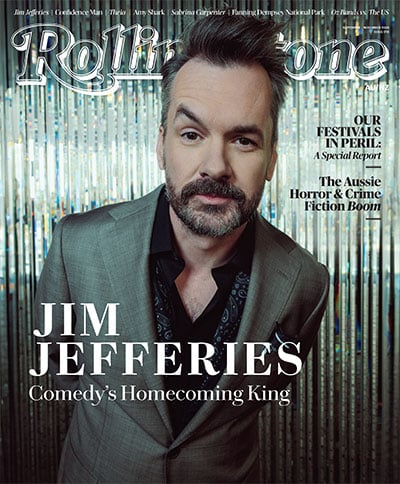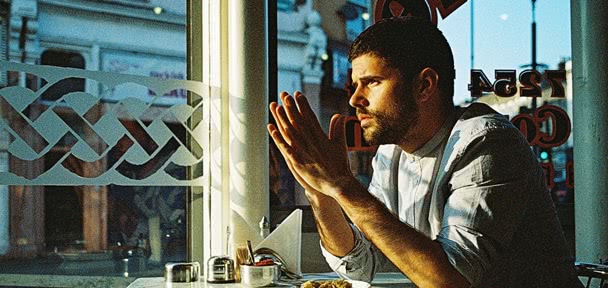Englishman Nick Mulvey is disarmingly upfront about his songwriting motivations, and his philosophy about the creative process – despite having its genesis in something slightly squeamish – is both fascinating and perspicacious. It has taken many years for Mulvey to find security as a solo performer, eased in no small measure by his time in the Mercury Prize-nominated band Portico Quartet.
Despite the differences between the band and his solo act, he never felt uneasy that Portico’s shadow would loom too large, or that the public would be unwilling to see him branch in new directions. “I very much took it one step at a time,” Mulvey says. “That lessens any frustration, because I wasn’t sitting there at the beginning of the process saying, ‘Why isn’t Jools Holland booking me now? Why aren’t I getting reviewed in newspapers?’ Being in the band for six years before that, and releasing two albums, I had a decent sense of the timescale and the process. So I knew very clearly that those things happened way down the line and that gladdened my perspective.
“My first move was to get into my musical heroes and really study and take seriously everything that they’d done to make sure what I was writing would, in my own way, complement that. Doing that meant that I haven’t found it all that difficult getting gigs. I know a lot of people in London who are struggling a lot more.”
‘Cucurucu’, the first single from his debut album, First Mind, is an ideal entry into Mulvey’s writing, incorporating as it does various influences and styles, from D. H. Lawrence to Cuban guitar picking. The sound is both compelling and unexpected – which, Mulvey is quick to point out, is rather the idea.
“I find that the more you start with, the drier the end result. What you end up writing is more what you think you should write about, or are received wisdoms. Now, received wisdoms are never as interesting as wisdoms,” he chuckles. “Paul Simon said that he never trusted a lyric that didn’t surprise him, and that he regards himself as the first audience member. I think that’s a really key thing. He is the artist, he’s writing it, that’s all significant. But he’s the first audience member – the song comes from somewhere else and he watches it happen. If it surprises him, then it’s worthwhile being there. Bob Dylan said in an interview that the world doesn’t need any more songs, it has a load of songs. And I really liked that. But he’s kind of right. There’s plenty out there that’s just made to sell, and [the world] doesn’t need more of those.”
The process of writing a song – writing anything creative, really – is an act many people struggle to relate, if only because the method varies so widely and is so very personal. To write something true, then – something that is not just “made to sell” – is the ambition. But by what scale can such a thing be judged? And by whose reckoning?
“It’s more about clearing the way,” Mulvey begins, and as he talks, his voice starts speeding up. “How much can you shut off of the internal radio. Rather than define what it is you allow, you let it happen. That’s why I called the album First Mind. Not [a state] of mind and thinking, it’s more of doing and being. This probably sounds pretty far out, and I don’t want to leave you thinking, ‘What the hell’s he talking about?’, but … I had a big [accident] on my motorbike about a year ago in India, and I had this significant gash on my leg. I was alright, it was all fine. But I was in Dubai airport, changing the dressing on the wound, and I noticed there was the beginning of a scab. I thought, ‘How interesting.’ I looked very closely at it, and something very naive but also fundamental popped into my mind. I know nothing about scabs. You can’t ask me any questions about them. And yet, there it was forming, and there are obviously all of these complex things that are going on there. I decided to watch it every day over the course of the scab, and this same primary thought kept expanding. It struck me that that is my sole effort as a songwriter. To create with the same intelligence with which that process is happening on my leg. It’s not one of thought and education and knowledge – it’s one of allowing that which we are take over. And that really requires getting rid of a lot of the… wait, did any of that make sense?”
It does, and there’s a symbolism in needing to be physically prised apart in order for something intangible to emerge.
“From there, I started thinking about the title First Mind. Originally I was thinking Instinct, until I woke up with lyrics in my head, ‘Why would we ever second guess when we both think the first mind is better?’ A lot of the dilemmas in life, the conundrums, come in some fundamental way from allowing this thinking mind, shall we call it, to interfere and second-guess your intuition. From that, it gave me the overarching theme that seemed to sum up the entire album.”
First Mind out now through Fiction / Caroline. Nick Mulvey will be playing at Splendour In The Grass 2014 with Outkast, Lily Allen, Interpol, Foster The People, London Grammar, Metronomy and many more at North Byron Parklands, Byron Bay from Friday July 25 – Sunday July 27. He will also be supporting Ben Howard at the Enmore Theatre on Thursday July 31, tickets online.

































